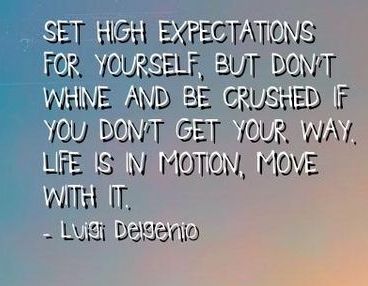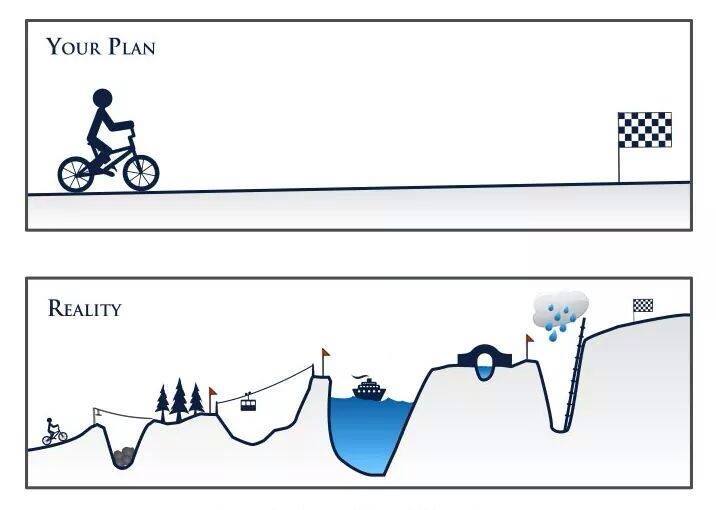
Cultivating healthy expectations from life plays a vital role in our happiness. The key to doing it successfully is to find that sweet spot of setting expectations that are challenging, but aren’t so high that they seem unreachable and unrealistic. Learn the skills and mindsets to master the art of cultivating healthy expectations. (Estimated reading time: 4 minutes)
“Shoot for the stars but if you happen to miss shoot for the moon instead.”
— Neil Armstrong
“The sky is the limit.”
“If you can dream it, you can do it.”
“Dream big!”
These were the kind of credo and life philosophy that my generation of millennials grew up listening to.
We are one of the first generations that were raised to believe that our fate is not limited by our external circumstances and that we have the power to become whoever we want be, if we believe in ourselves and if we’re willing to put in the work to realize our hopes and dreams.
This perspective is in stark contrast to the risk-averse attitude of the World War era generations whose sole objective in life was survival. They associated success with having the financial means to put food on the table and a roof above their heads.
Many of us have parents and grandparents who still have this outlook on life because they grew up in unstable and harsh political and economic conditions. Millennials, on the other hand, grew up in an era of freedom and independence.
We’re dreamers, innovators and pioneers with the creative prowess and business acumen that built empires of the likes of Facebook, Instagram, and several other successful startups. However, like anything else in life, this go-getter attitude has its downsides as well.
According to studies, generation Y has become one of the most dissatisfied generations because of their high expectations from life. The writer believes that their disappointment and restlessness is due to their sense of entitlement and exceedingly high expectations, which often go unmet.

Millenials (or Gen Ys) tend to have loftier expectations and they expect to reap the rewards faster than what’s realistically possible. The article states that these high expectations, coupled with feelings of being special, can mess them up on an emotional level when they realize that reality cannot match their expectations without hard work, diligence and patience.
While I think that the writer does make some valid points on this issue, I don’t believe that the best solution to this dilemma is to lower one’s expectations and settle for a mediocre and safe path.
All of us can dream big, as long as we accept that with great expectations comes more work, and the responsibility to manage our feelings.
The key is to find that sweet spot of setting expectations that are challenging, but aren’t so high that they seem unreachable and unrealistic.
Becoming too risk-averse will prevent us from taking the bold steps needed to move forward. Setting expectations from life that are too high can be de-motivating. We have to find the midpoint in the expectations continuum.
Reasonably high standards fuel us with the right emotions, giving us the drive and courage to live up to those standards. It’s been proven that the people who expect the best out of life tend to attract more good fortune into their world, compared to those who take on a more cautious approach.

If you’re the type of person who is aiming high, you should be prepared to put in higher than average levels of grit, heart and effort. You also need the emotional resilience to deal with delays, failures and disappointments.
These points are elaborated in this three-step process for setting healthy expectations:
1. Be aware of your thoughts: All our expectations are the product of our beliefs. There are subconscious thought patterns that we have developed over the years, which we may not be aware of, that are still affecting us. For example, if you grew up in a negative and toxic environment at home, you might choose to either walk down a mediocre path or become a person of substance. Whatever we have been exposed to can either lead us towards progress or derail us, depending on how we relate to it. Work on your thoughts and beliefs because they are at the root of your experiences.
2. Take an honest look at your current situation and capabilities: Before attempting to achieve a dream, we need to take an honest assessment of where we are right now in our present circumstances and we also need to evaluate our inventory of our skills, capabilities, experience and resources. For example, if your goal is to become an astronaut for NASA but you’re currently working as an accountant, you have to acknowledge where we are so that we can map out what we need to do to reach our desired destination. If we refuse to face the reality of our current situation, we’re setting ourselves up for disappointment and failure.
3. Manage your emotions: The road to success requires resilience. We need to be strong enough to deal with all the criticism, haters, obstacles and failure that come with the territory of playing a bigger game in life. The reason why some experts recommend playing it safe is because of the potentially detrimental psychological impact of dealing with unmet expectations, but if we can consciously work towards building our inner strength and a character that can withstand the storms and leap over hurdles, we’ll have what it takes to attain our vision.
Just like a paraglider, we have to be willing to step over the edge of a cliff before taking flight. We need to have faith that the winds will carry us high enough to fly over majestic vistas. Build the sturdiest wings so that you can soar high and enjoy the ride.
All my best on your journey,
Seline

Question for you: What are some steps that you’re willing to take in your efforts towards cultivating healthy expectations for your life?
Did you like this post? Sign up below and I’ll send you more awesome posts like this one every week.

Wow~ Such a great blog. I dont know how many times I have gotten frustrated trying to reach my goals. This is just what I needed to hear, and I know others who need to hear it too. I will definitely be sharing this with some friends of mine! Thanks for this wonderful post!
Sammy and Regina- happy to hear that this article got you thinking about important issues in your life. All the best! -Seline
Second what Sammy said- I know there are many times I am my own worst critic. I am too hard on myself much of the time. I know many people are that way too. I think the key is to be hard enough to stay motivated and disciplined but not so hard hat you tear yourself down and kill your momentum and motivation before you even get started.
You have given me some things to think about that is for sure!